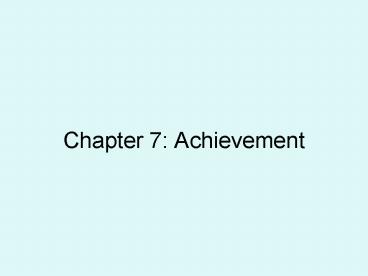Chapter 7: Achievement - PowerPoint PPT Presentation
1 / 19
Title: Chapter 7: Achievement
1
Chapter 7 Achievement
2
1. Achievement motivation
- A willingness to strive to succeed at challenging
tasks - Mastery motivation
- to explore, understand, and control ones
environment
3
2. From mastery to self-evaluation
- Stipek at al. (1992) found 3 phases in childrens
learning to evaluate their performances - Worked with 1- to 5- year-olds
4
Stipeks Three Phases of Self-Evaluation
- Joy in mastery
- Before age 2
- Not bothered by failures
- Dont call attention to triumphs/seek recognition
- Approval-seeking
- Near age 2
- Say things like, I did it with pleasure
- Hope to avoid criticism
- Use of standards
- Around age 3
- Adopt objective standards for appraising
performance - Seem to feel true pride and shame
5
3. Theories of achievement motivation and
behavior
- Need achievement theories
- McClelland
- Based on Murrays 28 human needs
- n Ach
- A learned motive
- Achievement motivation probably precedes economic
growth - Criticism predicts entrepreneurial success
- But maybe not success in science or actual
professions - A more nuanced view People differ in their
emotional reactions - High achievers welcome new challenges. Low
achievers dread new challenges.
6
3. Theories of achievement motivation and
behavior
- Need achievement theories, contd.
- Atkinson
- Achieve success Ms
- Avoid failure Ma f
- Ms gt Maf willingly accepts new challenges
- Maf gt Ms low achiever
- Also depends on value of the goal
7
3. Theories of achievement motivation and
behavior
- Need achievement theories, contd.
- Atkinson
- Value of the goal?
- Is this relevant to my future?
8
Is this relevant to my future?Mean GPA in intro
psych as a function of achievement motivation and
relevance of course to ones future
Relevance of Course to Ones Future
9
3. Theories of achievement motivation and
behavior
- Weiners attribution theory
- causal attributions
- Conclusions drawn about underlying causes of own
or others behavior - locus of control
- Are you personally responsible for your life
outcomes? Or, do they depend on circumstances
beyond your control?
10
3. Theories of achievement motivation and
behavior
- Weiners attribution theory
- Internal locus of control
- Personally responsible for what happens to them
- An A grade on a paper is interpreted to mean
they have good writing ability - External locus of control
- Outcomes depend on fate, luck, or actions of
others - An A grade is interpreted to mean luck, easy
grading, or other external cause
11
Weiners classification and explanations of a bad
test grade
Locus of causality
Internal cause
External cause
Stable cause
Unstable cause
12
3. Theories of achievement motivation and
behavior
- Dwecks learned helplessness theory
- Mastery orientation
- tendency to persist at challenging tasks because
one believes one will succeed - Learned helplessness orientation
- tendency to give up or stop trying after failure
because of attribution to lack of ability that
one cant change
13
4. Cultural and subcultural influences
- Individualism/collectivism
- Individualism stresses personal objectives
- Collectivism stresses goals that maximize social
welfare.
14
4. Cultural and subcultural influences
- Ethnic variations
- Early studies credited IQ
- Later studies credit SES
- NOT from lack of parental concern
- Probably from
- Subtle cultural differences in parenting
practices - Peer endorsement of academics
- Negative influence of social stereotypes on
academic performance
15
Stereotype threat
- Steele (1997)
- A fear that one will be judged to have traits
associated with negative social stereotypes about
his or her ethnic groups
16
Steele Aronson (1995)
17
4. Cultural and subcultural influences
- Social class differences
- Lower SES-homes
- experience greater psychological distress
- distress makes parents less sensitive,
supportive, comforting, etc. - may be less intellectually-stimulating to
children - Teachers may also respond differently to kids in
lower SES.
18
5. Home and family influences
- Attachment
- Home environment
- HOME inventory
- Measures home of infant, toddlers, or
preschoolers - Which measures are most important?
- Age-appropriate toys
- Independence training
- Achievement training
19
6. Gender differences
- In our culture, some traits or jobs have gained
gendered labels. - So, some girls think they are worse at math than
boys. - Interestingly, girls underestimate their
abilities and boys overestimate theirs. - Differences in achievement in US have to do with
areas and not abilities per se.































